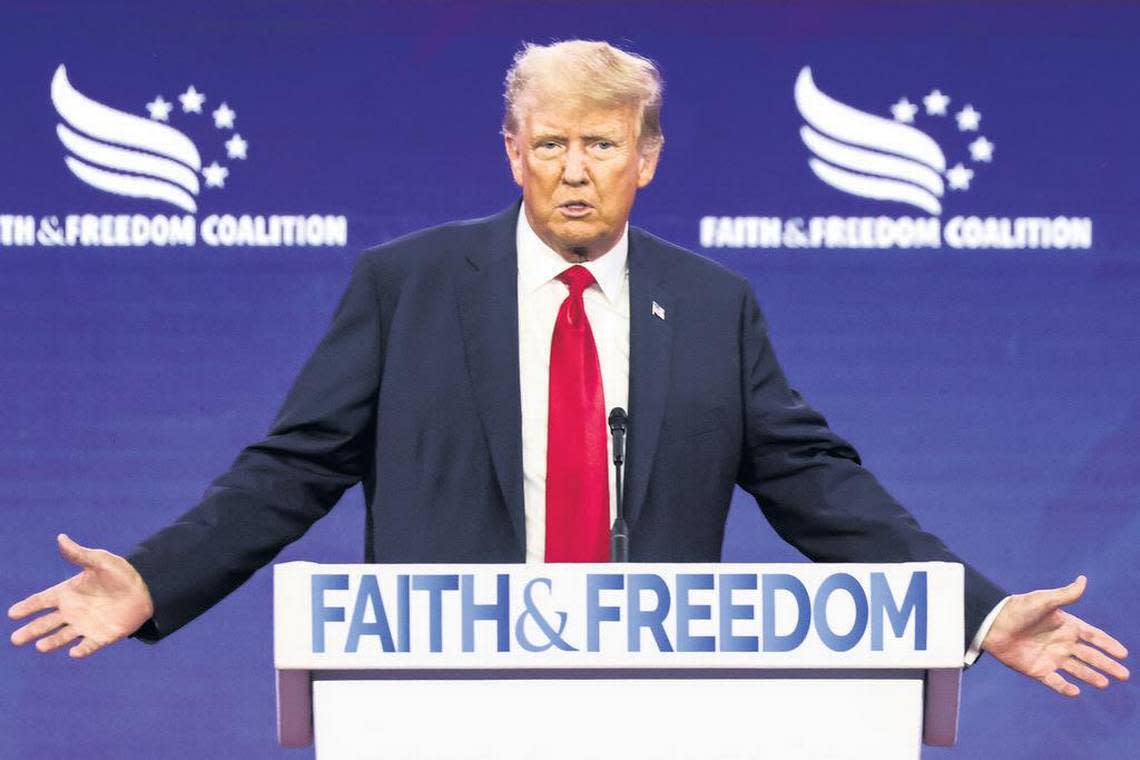How California’s new primary rules could help boost Donald Trump to the GOP nomination in 2024

- Oops!Something went wrong.Please try again later.
- Oops!Something went wrong.Please try again later.
Suddenly, California’s 2024 Republican presidential primary looks like it’s positioned to give former President Donald Trump a huge boost.
The state’s GOP executive committee changed the rules over the weekend so that any candidate getting a simple majority — 50% plus one — wins all of the state’s 169 delegates. If no one gets a majority, delegates would be awarded according to candidates’ vote percentages.
Tuesday, Trump quickly took advantage of the new rules. The state GOP announced he will visit its annual convention Sept. 29 in Anaheim. It will be the first time since 2016 Trump has appeared at a California Republican convention.
Trump is far ahead in California polls, and winning the state’s delegate votes would be an important step in his bid to collect the 1,234 delegates needed for nomination.
The previous California system awarded delegates according to who won each of the state’s 52 congressional districts. There were also 13 at-large delegates allocated according to the statewide vote total.
In theory, that could have meant Trump alternatives in less conservative areas — think San Francisco, Los Angeles or Sacramento — could have had a better shot at more delegates.
“The rule is also a self-inflicted wound, as candidates now have no incentive to organize and spend money at the district level. Very disappointing,” said Dave Gilliard, a Rocklin-based GOP consultant.
Matt Rexroad, a Yolo County-based strategist, said that the congressional district allocation method was designed to encourage presidential candidates to campaign all over the state.
“That is lost with this change. It may be good for Trump but it is bad for the Republican Party. Of course, Trump does not care about the party at all except as a funding vehicle,” said Rexroad, a Yolo County-based GOP consultant.
Trump’s campaign had enthusiastic praise for the change. “President Trump looks forward to working with the California Republican Party to Make America Great Again as he continues to dominate statewide polling by over 50%,” said spokesman Steven Cheung.
He chided Florida Gov. Ron DeSantis, who reportedly had hoped to gain ground on Trump in the primary, calling the California Republican decision a “a humiliating defeat as they tried to manipulate the party rules.”
At Never Back Down, a pro-DeSantis Super PAC, founder Ken Cuccinelli was highly critical of the revision.
“Smoke filled back rooms do not reflect the will of or benefit voters in any state. Yet across the country games are afoot to enhance the potential outcome of primary elections for one former president who half of the Republican electorate no longer wants as the party leader,” he said, noting that other states have adopted delegate selection rules that could favor Trump.
“Even with these asinine primary rules changes, we remain confident Governor DeSantis will become the Republican nominee and 47th president of the United States,” Cuccinelli said.
Trump and the primary
California Republican Chairwoman Jessica Millan Patterson said the change, approved by the party’s 100-member executive committee Saturday, was needed to comply with national party rules. If the state did not comply, it would lose half its delegates.
She was upbeat about what the rules mean for the state. “Republican presidential candidates will not only be encouraged to spend real time campaigning in our state and making their case to voters, but Republican voters will equally be encouraged to turn out to support their chosen candidate to help them win delegates,” Patterson said in a statement.
California politicos had high hopes that its primary would be consequential this time. In 2016 and 2020, the state’s June Republican primary was virtually meaningless, since the nominations had been decided weeks or months earlier.
Next year, though, California will be one of at least 14 states voting on Super Tuesday March 5, just weeks after the early states of Iowa, New Hampshire, South Carolina and Nevada vote.
Under the previous system, with his rivals able to pick off delegates in less Trump-friendly areas, they would have a decent shot at picking up blocs of delegates.
So far, Trump is ahead by almost any measure, despite two criminal indictments, the likelihood of a trial starting next spring, and perhaps more indictments shortly.
Trump was the preference of 50% of California’s likely Republican voters in the June Public Policy Institute of California poll. Next was DeSantis at 24% and former Vice President Mike Pence at 10%.
Another June California poll of registered Republican voters, conducted by Emerson College, had Trump with 53% and DeSantis with 19%.
Trump also leads the money race. He has raised $3.1 million in contributions of over $200 in California since November, when he announced his bid for a second presidential term, according to the nonpartisan OpenSecrets, which analyzed the data for McClatchy.
DeSantis, who announced in late May and held a June fundraiser in Sacramento, has received $2.1 million from donations of over $200. Smaller contributions do not need to be reported as part of the Federal Election Commission campaign filings.
At the moment, said John Pitney, professor of government at Claremont McKenna College in California, “It’s just hard to see any outcome other than Trump getting the nomination and clinching very early.”

